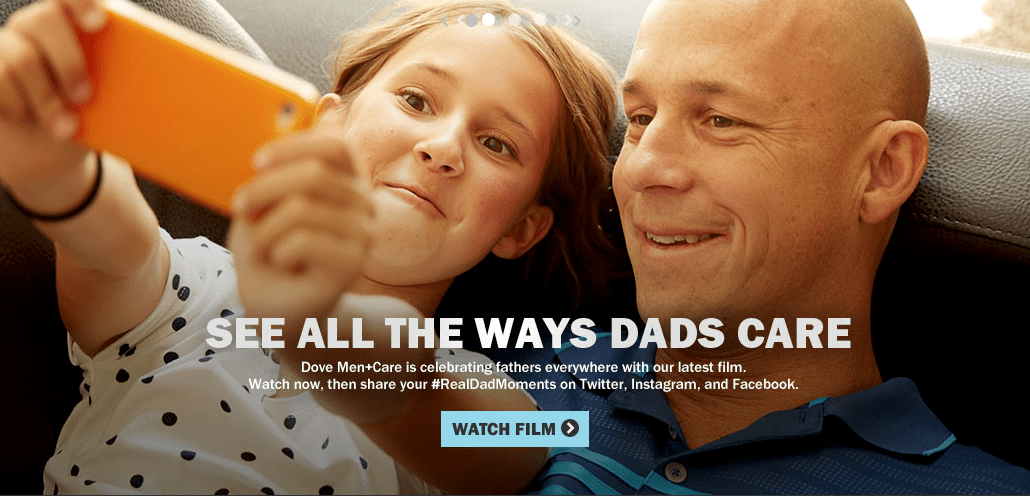Secure your place at the Digiday Publishing Summit in Vail, March 23-25

Dove is reverting to sentimentality for its latest ad campaign, this time training its socially conscious eye on dear old Dad.
Dove’s male-focused brand Men+Care launched a video and social media campaign on Monday aimed at accurately depicting modern fathers’ roles in their children’s lives.
The campaign somewhat mirrors Dove’s wildly popular “Real Beauty Sketches” campaign in that it deals with a schism between perception and reality. The “Real Beauty Sketches” video — which addressed the schism between how beautiful women feel and how they’re actually perceived — was viewed 163 million times worldwide as of June 2013, according to Google, and was awarded the Titanium Grand Prix at the Cannes Lions festival in 2013. Dove’s subsequent real beauty ad “Patches” spurred some backlash, however, for making women look gullible and lacking confidence.
This new campaign is aimed at men, however. It specifically targets fathers who feel as though their role in child-rearing is not fairly represented in the media. Research conducted for the campaign revealed that fathers feel they and their fatherly responsibilities are routinely misrepresented as clueless, ineffectual or outdated. The new commercial seeks to rectify that.
The spot shows dads offering their children the kind of emotional support stereotypically associated with motherhood, for instance.
Only 20% of dads think the care they give is reflected in the media. #ModernDads#RealDadMomentshttps://t.co/DcjmoS4NVw
— Dove Men+Care (@DoveMenCare) June 9, 2014
Dove Men+Care also sponsored a segment on the “Today Show” on Monday morning in which children were asked about their fathers:
Visit NBCNews.com for breaking news, world news, and news about the economy
The show tweeted the Dove Men+Care commercial from its own account Monday morning.
From #ModernDads sponsor @DoveMenCare‘s study: 64% of dads feel inaccurately depicted in portrayals of fatherhood https://t.co/uIfY1hImAQ
— TODAY (@TODAYshow) June 9, 2014
The campaign is meant to coincide with the lead-up to Father’s Day this Sunday. The message from Unilever appears to be that Dove is for fathers. (Unilever’s Axe brand is better suited to young, single males who aspire to be mauled by women in public spaces.)
“We anticipate men’s needs at different stages of their lives, and create products to meet them,” Unilever’s vp of marketing Rob Candelino told Digiday. “The Dove Men+Care and Axe users are guys at different stages in their lives, and each brand’s efforts are tailored to reflect the unique interests and needs of these men.”
Vincent DiCaro, vp of non-profit organization the National Fatherhood Initiative, praised the new campaign’s portrayal of fathers.
“It does actually do a great job of presenting a positive and realistic image of fathers, and that can be helpful,” DiCaro said. “But it is also a sentimental way to sell soap. And there’s no reason why it can’t be successful at both of those things.”
DiCaro added that the Dove spot does represent a shift away from how dads are typically portrayed negatively in ads. “It’s like advertisers have a playbook that says, ‘If we want a laugh in our ad, we will have a woman mocking her husband,’” he said.
It’s no surprise Dove Men+Care decided to tug at dads’ heartstrings given the immense amount of publicity “Real Beauty Sketches” generated. But the feel-good commercials reveal an interesting difference in how men and women view themselves: The “Real Beauty Sketches” illustrated (literally) that women are more beautiful than they perceive themselves to be. #RealDadMoments shows men think they’re under-appreciated relative to what the world thinks of them.
If brands are publishers, now, then perhaps Dove is printing a sociology journal.
Image via Dove Men+Care
More in Marketing

Why Edward Jones’ agentic AI trial comes with limits
Edward Jones tests agentic AI to drive marketing productivity, taking a measured approach as it stops short of full automation.

Footwear brands navigate uncertainty after latest tariffs flip-flop
Some 99% of footwear sold in the U.S. today is imported, according to the Footwear Distributors and Retailers of America.

Brands at eTail Palm Springs share lessons on the ‘messy middle’ of building AI tools
Here’s a rundown of lessons brands have shared about their AI implementations so far.





